I’m currently studying for Microsoft exam 70-413. I do enjoy studying for exams. It’s hard, but it’s an excellent forcing function. I learn bits and pieces here and there now and then about this and that, but when I have an exam schedule for a set date, I have to study! And not only do I put in more hours, but I follow a more systematic approach. In this article, I’m going to share GreatExam braindumps in case you too are studying and this method works for you.
QUESTION 81
Your network contains an Active Directory forest named contoso.com.
The forest functional level is Windows Server 2012.
The forest contains an Active Directory domain.
The domain contains a global security group named GPO_Admins that is responsible for managing Group Policies in the forest.
A second forest named fabrikam.com contains three domains.
The forest functional level is Windows Server 2003.
You need to design a trust infrastructure to ensure that the GPO_Admins group can create, edit, and link Group Policies in every domain of the fabrikam.com forest.
What should you include in the design? More than one answer choice may achieve the goal. Select the BEST answer.
A. A two-way forest trust
B. A one-way forest trust
C. Three external trusts
D. Three shortcut trusts
Answer: B
Explanation:
A one-way trust is a unidirectional authentication path created between two domains. In a one-way trust between Domain A and Domain B, users in Domain A can access resources in Domain
B. However, users in Domain B cannot access resources in Domain A. In this question Domain A would be contoso.com, which has the GPO_Admins group, and Domain B would the fabrikam.com domain, to which the GPO_Admins should have access.
https://technet.microsoft.com/en-us/library/cc773178(v=ws.10).aspx
QUESTION 82
Your network contains an Active Directory domain named contoso.com.
Client computers run either Windows 7 or Windows 8.
You plan to implement several Group Policy settings that will apply only to laptop computers.
You need to recommend a Group Policy strategy for the planned deployment.
What should you include in the recommendation? More than one answer choice may achieve the goal. Select the BEST answer.
A. Loopback processing
B. WMI filtering
C. Security filtering
D. Block inheritance
Answer: B
Explanation:
http://www.discoposse.com/index.php/2012/04/05/group-policy-wmi-filter-laptop-or-desktop-hardware/
Another method to detect hardware as laptop only is to look for the presence of a battery based on the BatteryStatus property of the Win32_Battery class. By using the Win32_Battery class, we can search to see if there is a battery present. If the battery status is not equal to zero ( BatteryStatus <> 0 ) then you know that it is a laptop.
QUESTION 83
Your network contains an Active Directory domain named contoso.com.
The domain contains an organizational unit (OU) named OU1.
You have a Group Policy object (GPO) named GPO1 that is linked to contoso.com.
GPO1 contains custom security settings.
You need to design a Group Policy strategy to meet the following requirements:
– The security settings in GPO1 must be applied to all client computers.
– Only GPO1 and other GPOs that are linked to OU1 must be applied to the client computers in OU1.
What should you include in the design? More than one answer choice may achieve the goal. Select the BEST answer.
A. Enable the Block Inheritance option at the domain level.
Enable the Enforced option on GPO1.
B. Enable the Block Inheritance option on OU1.
Link GPO1 to OU1.
C. Enable the Block Inheritance option on OU1.
Enable the Enforced option on GPO1.
D. Enable the Block Inheritance option on OU1.
Enable the Enforced option on all of the GPOs linked to OU1.
Answer: C
QUESTION 84
A new company registers the domain name of contoso.com.
The company has a web presence on the Internet.
All Internet resources have names that use a DNS suffix of contoso.com.
A third-party hosts the Internet resources and is responsible for managing the contoso.com DNS zone on the Internet.
The zone contains several hundred records.
The company plans to deploy an Active Directory forest.
You need to recommend an Active Directory forest infrastructure to meet the following requirements:
– Ensure that users on the internal network can resolve the names of the company’s Internet resources.
– Minimize the amount of administrative effort associated with the addition of new Internet servers.
What should you recommend?
A. A forest that contains a root domain named contoso.com and another domain named ad.contoso.com
B. A forest that contains a root domain named contoso.com and another domain named contoso.local
C. A forest that contains a single domain named contoso.local
D. A forest that contains a single domain named contoso.com
Answer: C
QUESTION 85
Your network contains an Active Directory domain named contoso.com.
The domain contains four computers that are configured as shown in the following table.
You plan to use domain controller cloning.
You need to identify on which computers you can clone domain controllers that run Windows Server 2012.
Which computers should you identify? (Each correct answer presents part of the solution. Choose all that apply.)
A. Server1
B. Server2
C. Server3
D. Client1
Answer: AD
Explanation:
DC cloning can be done from either Hyper-V on Server 2012 and Hyper-V on Windows 8.
QUESTION 86
Your network contains an Active Directory domain named contoso.com.
The network contains a server named Server1 that has the Hyper-V server role installed.
Server1 hosts a virtual machine named VM1.
You deploy a new standalone server named Server2.
You install the Hyper-V server role on Server2.
Another administrator named Admin1 plans to create a replica of VM1 on Server2.
You need to ensure that Admin1 can configure Server2 to receive a replica of VM1.
To which group should you add Admin1?
A. Server Operators
B. Domain Admins
C. Hyper-V Administrators
D. Replicator
Answer: C
QUESTION 87
Your network contains an Active Directory domain named contoso.com.
All domain controllers run Windows Server 2012 R2.
The domain contains a server named Server1 that runs Windows Server 2012 R2.
You need to ensure that when users log on to Server1, their user account is added automatically to a local group named Group1 during the log on process.
Which Group Policy settings should you modify?
A. Restricted Groups
B. Security Options
C. User Rights Assignment
D. Preferences
Answer: D
QUESTION 88
Your network contains an Active Directory domain named contoso.com.
On several organizational units (OUs), an administrator named Admin1 plans to delegate control of custom tasks.
You need to ensure that Admin1 can delegate a custom task named Task1 by using the Delegation of Control Wizard.
What should you do?
A. Add a new class to the Active Directory schema.
B. Configure a custom MMC console.
C. Modify the Delegwiz.inf file.
D. Configure a new authorization store by using Authorization Manager.
Answer: C
Explanation:
http://support.microsoft.com/kb/308404
QUESTION 89
Your network contains an Active Directory domain named contoso.com.
You deploy Active Directory Certificate Services (AD CS).
Your company, which is named Contoso, Ltd., has a partner company named Fabrikam, Inc. Fabrikam also deploys AD CS. Contoso and Fabrikam plan to exchange signed and encrypted email messages.
You need to ensure that the client computers in both Contoso and Fabrikam trust each other’s email certificates.
The solution must prevent other certificates from being trusted.
What should you do? More than one answer choice may achieve the goal. Select the BEST answer.
A. Implement an online responder in each company.
B. Exchange the root certification authority (CA) certificates of both companies, and then deploy the certificates to the Trusted Root Certification Authorities store by using Group Policy objects (GPOs).
C. Exchange the root certification authority (CA) certificates of both companies, and then deploy the certificates to the Enterprise Trust store by using Group Policy objects (GPOs).
D. Implement cross-certification in each company.
Answer: D
QUESTION 90
Your network contains a server named Server1 that runs Windows Server 2012.
Server1 has the DHCP Server server role installed.
All of the client computers that are in a subnet named Subnet1 receive their IP address configurations from Server1.
You plan to add another DHCP server named Server2 to Subnet1.
You need to recommend changes to the DHCP infrastructure to ensure that the client computers continue to receive IP addressing information if a single DHCP server fails.
What should you do? More than one answer choice may achieve the goal. Select the BEST answer.
A. Create a Network Load Balancing (NLB) cluster.
B. Configure Failover for the scope.
C. Create a DHCP failover cluster.
D. Create a split scope.
Answer: B
Explanation:
http://blogs.technet.com/b/keithmayer/archive/2012/10/28/step-by-step-scoping-out-the-new-dhcpfailover-inwindows-server-2012-31-days-of-favorite-features-part-28-of-31.aspx#.UQhW-b-jbK0
QUESTION 91
Your network contains an Active Directory forest named contoso.com.
The forest contains one domain.
Your company plans to open a new division named Division1.
A group named Division1Admins will administer users and groups for Division1.
You identify the following requirements for Division1:
– All Division1 users must have a complex password that is 14 characters.
– Division1Admins must be able to manage the user accounts for Division1.
– Division1Admins must be able to create groups, and then delete the groups that they create.
– Division1Admins must be able to reset user passwords and force a password change at the next logon for all Division1 users.
You need to recommend changes to the forest to support the Division1 requirements.
What should you recommend? More than one answer choice may achieve the goal. Select the BEST answer.
A. Create a new child domain named divisionl.contoso.com.
Move all of the Division1 user accounts to the new domain.
Add the Division1Admin members to the Domain Admins group.
Configure the password policy in a Group Policy object (GPO).
B. In the forest, create a new organizational unit (OU) named Division1 and add
Division1Admins to the Managed By attribute of the new OU.
Move the Division1 user objects to the new OU.
Create a fine-grained password policy for the Division1 users.
C. Create a new forest. Migrate all of the Division1 user objects to the new forest and add the
Division1Admins members to the Enterprise Admins group.
Configure the password policy in a Group Policy object (GPO).
D. In the forest, create a new organizational unit (OU) named Division1 and delegate
permissions for the OU to the Division1Admins group.
Move all of the Division1 user accounts to the new OU.
Create a fine-grained password policy for the Division1 users.
Answer: D
QUESTION 92
Your company has a main office and four branch offices.
The main office is located in London.
The network contains an Active Directory domain named contoso.com.
The network is configured as shown in the exhibit. (Click the Exhibit button.)
Each office contains several servers that run Windows Server 2012.
In each branch office, you plan to deploy an additional 20 servers that will run Windows Server 2012. Some of the servers will have a Server Core Installation of Windows Server 2012.
You identify the following requirements for the deployment of the new servers:
– Operating system images must be administered centrally.
– The operating system images must be deployed by using PXE.
– The WAN traffic caused by the deployment of each operating system must be minimized.
You need to recommend a solution for the deployment of the new servers.
What should you recommend?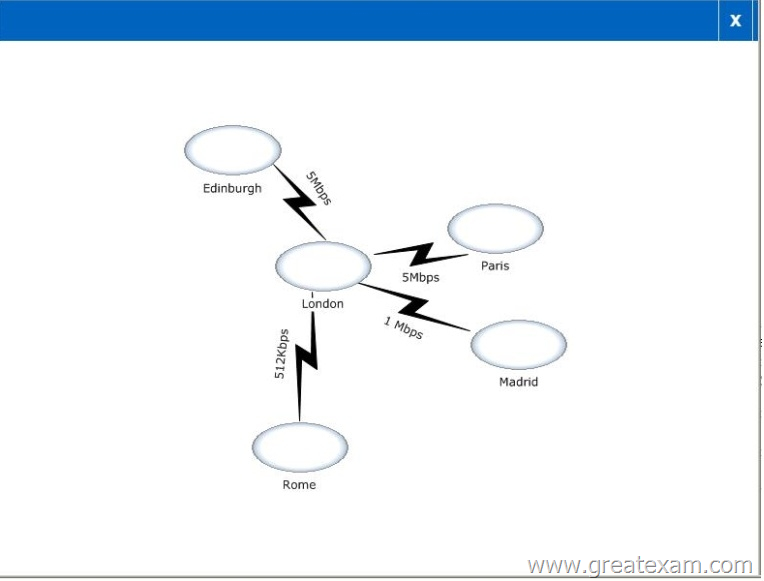
A. Deploy Windows Deployment Services (WDS) in each office.
Replicate the images by using Distributed File System (DFS) Replication.
B. Deploy Windows Deployment Services (WDS) in each office.
Copy the images by using BranchCache.
C. Deploy Windows Deployment Services (WDS) in the main office only.
Copy the images by using BranchCache.
D. Deploy Windows Deployment Services (WDS) in the main office only.
Replicate the images by using Distributed File System (DFS) Replication.
Answer: A
QUESTION 93
Your network contains an Active Directory domain named contoso.com.
The domain contains a Microsoft System Center 2012 infrastructure.
The domain contains two sites named Site1 and Site2.
The sites connect to each other by using a 1-Mbps WAN link.
The sites contain four servers.
The servers are configured as shown in the following table.
In Site2, you plan to deploy 50 Hyper-V hosts.
You need to recommend a solution to deploy the Hyper-V hosts by using VMM.
The solution must minimize the amount of traffic between Site1 and Site2 during deployment.
What should you recommend?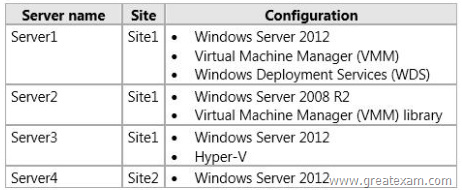
A. On Server4, install VMM.
From the Virtual Machine Manager console, add Server1 as a PXE server and add Server4 as a library server.
B. On Server4/ install VMM.
From the Virtual Machine Manager console, add Server1 as a PXE server and a library server.
C. On Server4, install WDS.
From the Virtual Machine Manager console, add Server4 as a PXE server and a library server.
D. On Server4, install WDS.
From the Virtual Machine Manager console, add Server4 as a PXE server and add Server1 as a library server.
Answer: C
QUESTION 94
Your network contains an Active Directory forest named contoso.com.
You plan to add a new domain named child.contoso.com to the forest.
On the DNS servers in child.contoso.com, you plan to create conditional forwarders that point to the DNS servers in contoso.com.
You need to ensure that the DNS servers in contoso.com can resolve names for the servers in child. contoso.com.
What should you create on the DNS servers in contoso.com?
A. A root hint
B. A zone delegation
C. A conditional forwarder
D. A trust point
Answer: B
Explanation:
Understanding Zone Delegation
Domain Name System (DNS) provides the option of dividing up the namespace into one or more zones, which can then be stored, distributed, and replicated to other DNS servers. When you are deciding whether to divide your DNS namespace to make additional zones, consider the following reasons to use additional zones:
* You want to delegate management of part of your DNS namespace to another location or department in your organization.
* You want to divide one large zone into smaller zones to distribute traffic loads among multiple servers, improve DNS name resolution performance, or create a more-fault- tolerant DNS environment.
* You want to extend the namespace by adding numerous subdomains at once, for example, to accommodate the opening of a new branch or site.
https://technet.microsoft.com/en-us/library/cc771640.aspx
QUESTION 95
Your network contains a server named Server1 that runs Windows Server 2012.
Server1 has the DHCP Server server role installed.
The network contains a Virtual Desktop Infrastructure (VDI).
All virtual machines run Windows 8.
You identify the following requirements for allocating IPv4 addresses to client computers:
– All virtual desktops must have static IP addresses.
– All laptop computers must receive dynamic IP addresses.
– All virtual desktops must be prevented from obtaining dynamic address.
You need to recommend a DHCP solution that meets the requirements for allocating IPv4 addresses.
The solution must use the least amount of administrative effort.
What should you recommend? More than one answer choice may achieve the goal. Select the BEST answer.
A. Create two physical subnets.
Configure 802.1x authentication for each subnet.
B. Create two physical subnets.
Connect the laptop computers to the subnet that contains Server1.
C. Configure DHCP filtering.
D. Configure DHCP policies.
Answer: C
Explanation:
Policies would work too but filtering is less effort.
QUESTION 96
Your network contains an Active Directory forest that has two domains named contoso.com and europe. contoso.com.
The forest contains five servers.
The servers are configured as shown in the following table.
You plan to manage the DHCP settings and the DNS settings centrally by using IP Address Management (IPAM).
You need to ensure that you can use IPAM to manage the DHCP and DNS settings in both domains.
The solution must use the minimum amount of administrative effort.
What should you do?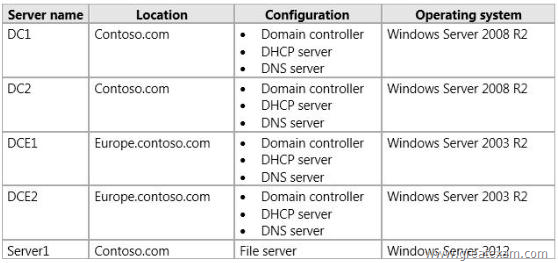
A. Upgrade DCE1 and DCE2 to Windows Server 2012, and then install the IP Address
Management (IPAM) Server feature.
Run the Invoke-IpamGpoProvisioning cmdlet for each domain.
B. Upgrade DCE1 and DCE2 to Windows Server 2012, and then install the IP Address
Management (IPAM) Server feature.
Run the Set-IpamConfiguration cmdlet for each domain.
C. Upgrade DC1 and DC2 to Windows Server 2012, and then install the IP Address
Management (IPAM) Server feature.
Run the Set-IpamConfiguration cmdlet for each domain.
D. Upgrade DC1 and DC2 to Windows Server 2012, and then install the IP Address
Management (IPAM) Server feature.
Run the Invoke-IpamGpoProvisioning cmdlet for each domain.
Answer: A
Explanation:
Invoke-IpamGpoProvisioning
Creates and links group policies in the specified domain for provisioning required access settings on the servers managed by the computer running the IP Address Management (IPAM) server.
http://technet.microsoft.com/en-us/library/jj553805.aspx
Set-IpamConfiguration
Sets the configuration for the computer running the IP Address Management (IPAM) server, including the TCP port number over which the computer running the IPAM Remote Server Administration Tools (RSAT) client connects with the computer running the IPAM server.
http://technet.microsoft.com/en-us/library/jj590816.aspx
QUESTION 97
Your company is a hosting provider that provides cloud-based services to multiple customers.
Each customer has its own Active Directory forest located in your company’s datacenter.
You plan to provide VPN access to each customer.
The VPN solution will use RADIUS for authentication services and accounting services.
You need to recommend a solution to forward authentication and accounting messages from the perimeter network to the Active Directory forest of each customer.
What should you recommend? More than one answer choice may achieve the goal. Select the BEST answer.
A. A RADIUS server for each customer and one RADIUS proxy
B. A RADIUS server for each customer and a RADIUS proxy for each customer
C. One RADIUS proxy and one Active Directory Lightweight Directory Services (AD LDS) instance for each customer
D. One RADIUS proxy for each customer and Active Directory Federation Services (AD FS)
Answer: A
QUESTION 98
Your network contains an Active Directory domain named contoso.com.
The domain contains two domain controllers named DC1 and DC2 that run Windows Server 2008 R2.
You plan to replace the domain controllers with new servers that run Windows Server 2012.
The new servers will be named DC3 and DC4.
You need to recommend a strategy to replace DC1 and DC2 with DC3 and DC4.
The solution must minimize the amount of disruption to the users.
Which three actions should you recommend? To answer, move the appropriate three actions from the list of actions to the answer area and arrange them in the correct order.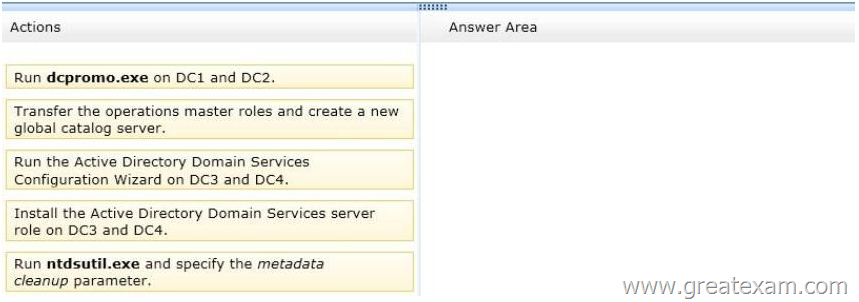
Answer: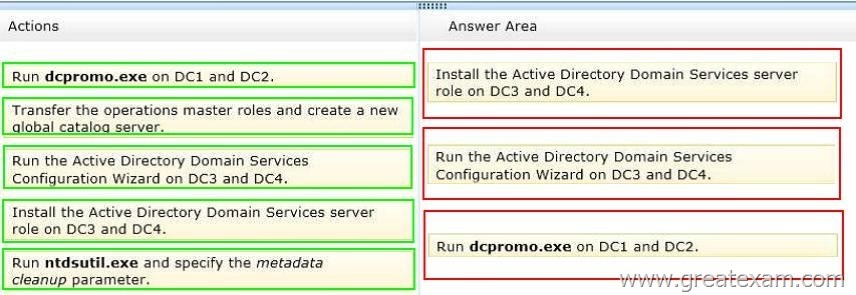
Explanation:
DCPROMO can automatically move any FSMO Roles.
http://carlwebster.com/what-happens-to-the-fsmo-roles-when-the-domain-controller-that-holds-them-is-demoted/
QUESTION 99
Your network contains an Active Directory forest.
The forest contains two domains named contoso.com and fabrikam.com.
You plan to decommission the fabrikam.com domain.
You need to perform the following migration tasks:
– Copy user accounts from the fabrikam.com domain to the contoso.com domain.
– Move the client computers from fabrikam.com to contoso.com.
The solution must ensure that all of the user profiles are associated to the migrated user accounts.
Which tool should you use to perform each task? To answer, drag the appropriate tool to the correct migration task in the answer area. Each tool may be used once, more than once, or not at all. Additionally, you may need to drag the split bar between panes or scroll to view content.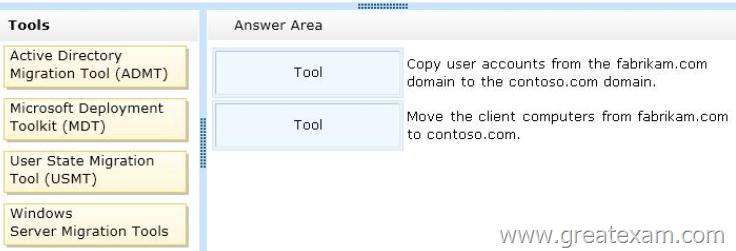
Answer: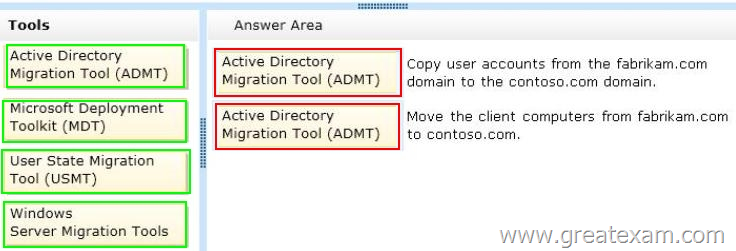
QUESTION 100
Your network contains an Active Directory domain named contoso.com.
The domain contains a server named Server1 that runs Windows Server 2008 R2.
Server1 is a file server.
You deploy a new member server named Server2 that runs Windows Server 2012.
You plan to migrate file shares from Server1 to Server2.
File share and NTFS permissions are assigned only to domain local groups.
You need to identify which actions are required to perform the migration.
Which five actions should you identify? To answer, move the five appropriate actions from the list of actions to the answer area and arrange them in the correct order.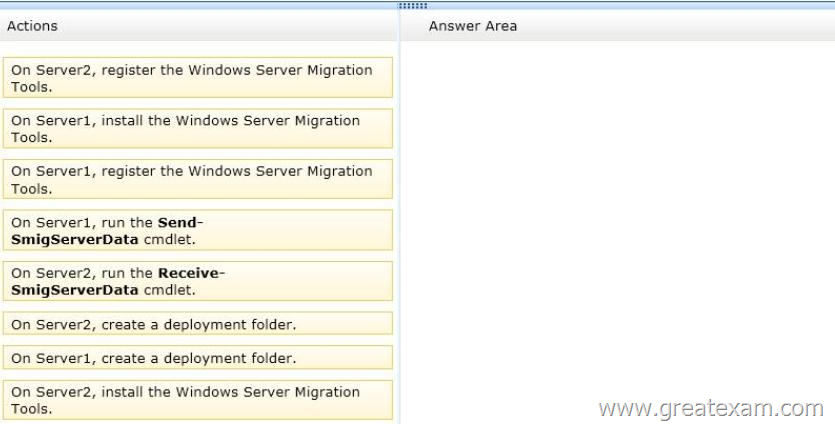
Answer: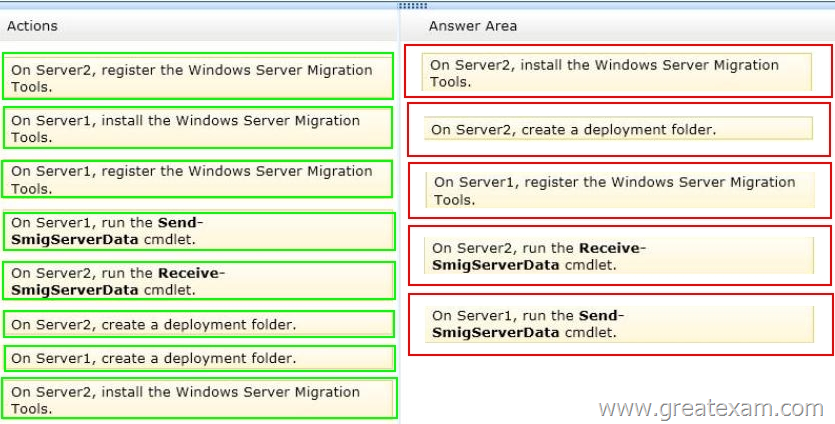
Explanation:
Box 1: On Server2, install the Windows Server Migration Tools.
Box 2: On Server2, create a deployment folder.
Box 3: On Server1, register the Windows Server Migration Tools.
Box 4: On Server1, run the Send-SmigServerData cmdlet.
Box 5:On Server2, run the Receive-SmigServerData cmdlet.
Note:
* Windows Server Migration Tools installation and preparation can be divided into the following stages.
1.Installing Windows Server Migration Tools on destination servers that run Windows Server 2012.
2.Creating deployment folders on destination servers that run Windows Server 2012, for copying to source servers.
3.Copying deployment folders from destination servers to source servers.
4.Registering Windows Server Migration Tools on source servers.
* Registering Windows Server Migration Tools on source computers Before you can use a technology’s Windows PowerShell snap-in for the first time, it must be registered with Windows PowerShell. You can use SmigDeploy.exe to register the Windows Server Migration Tools snap-in on a migration source computer
*Send-SmigServerData
This cmdlet migrates folders, files, and associated permissions and share properties from the local server to a target server. Send-SmigServerData must be run on the source server at the same time that the Receive-SmigServerData cmdlet is running on the destination server.
*Receive-SmigServerData
This cmdlet allows a target server to receive shares, folders, files, and associated permissions and share properties that are migrated from a source server. Receive-SmigServerData must be running on the destination server at the same time that the Send-SmigServerData cmdlet is running on the source server.
* File server or data migration can be achieved by migrating the data from the existing server using tools such as Microsoft Robocopy and Microsoft File Server Migration Tool (FSMT), or directly presenting the storage
Logical Unit Number (LUNs) onto a new server.
* Windows Server Migration Tools is a feature that is available for installation on computers that are running Windows Server 2008 R2 by using the Add Features Wizard in Server Manager. Windows Server Migration
Tools can be removed from Windows Server 2008 R2 byusing the Remove Features Wizard.
To migrate roles, features, and other data by using Windows Server Migration Tools, you must also deploy Windows Server Migration Tools on source servers from which you want to migrate data. Windows Server Migration Tools is deployed on source servers by creating a deployment folder on a computer that is running Windows Server 2008 R2, and then copying it to the pre-Windows Server 2008 R2 source computer operating systems shown in the table in this topic.
If you want to prepare for 70-413 exam in shortest time, with minimum effort but for most effective result, you can use GreatExam 70-413 practice test which simulates the actual testing environment and allows you to focus on various sections of 70-413 exam. Best of luck!





